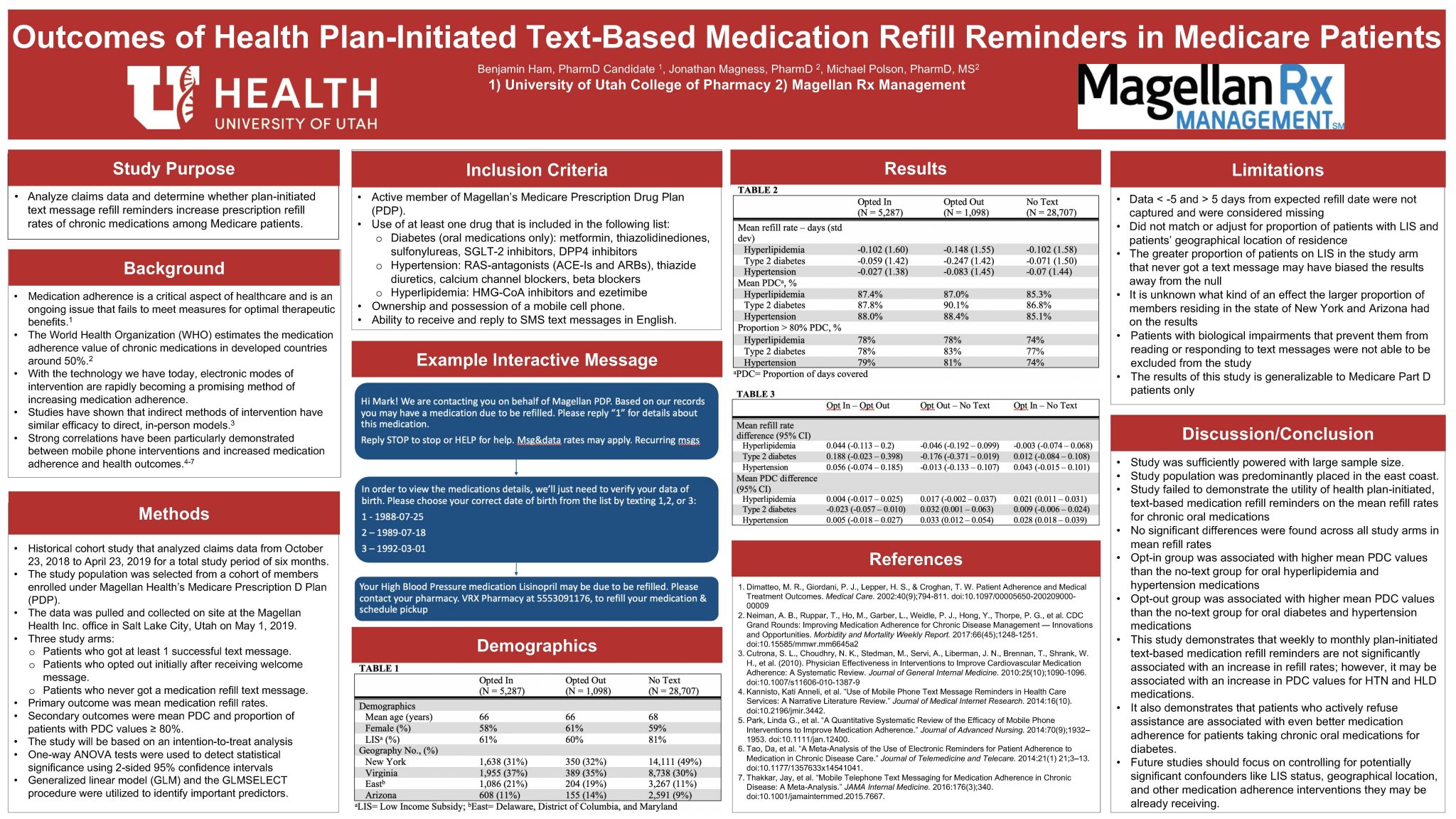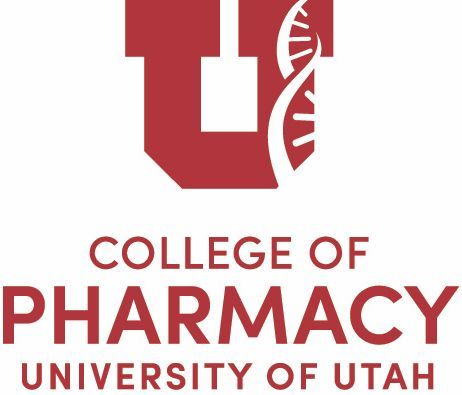Outcomes of Health Plan Initiated Text-Based Medication Refill Reminders in Medicare Patients

Background
Medication adherence is a critical aspect of healthcare and is an ongoing issue that fails to meet measures for optimal therapeutic benefits.1 However, the World Health Organization (WHO) estimates the medication adherence value of chronic medications in developed countries around 50%.2 With the technology we have today, electronic modes of intervention are rapidly becoming a promising method of increasing medication adherence. Studies have shown that indirect methods of intervention have similar efficacy to direct, in-person models.3 Additionally, strong correlations have been particularly demonstrated between mobile phone interventions and increased medication adherence and health outcomes.4-7
Objective
Analyze claims data and determine whether plan-initiated text message refill reminders increase prescription refill rates of chronic medications among Medicare patients.
Methods
This will be a historical cohort study that will collect and analyze data from October 23, 2018 to April 23, 2019 for a total study period of six months. The study population will be selected from a cohort of members enrolled under Magellan Health’s Medicare Prescription D Plan (PDP). The primary outcome of this study will be mean refill rates. The secondary outcomes were PDC and proportion of patients with PDC values ≥ 80%. All outcomes were stratified into three disease states (i.e., hyperlipidemia (HLD), Type 2 diabetes (T2DM), and hypertension (HTN)) the patients were taking their chronic medications for. The two-sided 95% confidence intervals were utilized to determine statistical significance. The one-way ANOVA tests were used to detect statistical significance at an alpha of 0.05 between the three arms. The generalized linear model (GLM) and the GLMSELECT procedure were utilized to identify important predictors.
Results
The opt-in group was associated with 2.1% (95% CI, 1.1 – 3.1%) higher mean PDC for HLD medications compared to the no-text group. The opt-out group was associated with 3.2% (95% CI, 0.1 – 6.3%) higher mean PDC than the no-text group for T2DM medications. Additionally, both the opt-in and opt-out groups were associated with higher mean PDC for HTN medications compared to the no-text group, 2.8% (95% CI, 1.8 – 3.9%) and 3.3% (95% CI, 1.2 – 5.4%) respectively. Finally, the GLM and GLMSELECT models identified LIS status, the region of Arizona, and the region of New York to be the most significant confounding predictors.
Conclusions
This study demonstrates that weekly to monthly plan-initiated text-based medication refill reminders are not significantly associated with an increase in refill rates; however, it may be associated with an increase in PDC values for HTN and HLD medications. Future studies should focus on controlling for potentially significant confounders like LIS status, geographical location, and other medication adherence interventions they may be already receiving.

Benjamin, nicely done! I’m curious whether there is a ceiling effect here; that is, your PDC and percent of patients in every group with PDC≥80 were all pretty high. So, might people managed through Magellan just be better off, overall, in terms of medication adherence? There simply is little room for you to show any improvement because they’re adherent anyway?
Great point Dr. Keefe. We were surprised to find out how high the members’ adherence was as well. The ceiling effect definitely seems to play a role here; however, I wouldn’t say that they are all better off. Instead, I would want to develop creative interventions that may better target the population with PDC < 80%, and have future studies include them exclusively to assess efficacy.
Great job! I find it so fascinating that the people who actively refused the text reminders did as well as they did. I’m pleased they were appropriately confident in their ability to remain adherent.
Thank Michael! It is very interesting indeed.
Seems like text messages would increase compliance in absent- minded profs… I’m surprised it didn’t help these patients. Good job on the poster!
Thank you Dr. Lim! The results were definitely surprising but I am a firm believer that all results, showing significant difference or not, are good results.
Hi Ben, nice job on your poster and project! I’m curious, do you know if there is any literature on different methods of increasing medication adherence such as refill syncronization?
Thanks Angie! There are definitely many studies on other methods of increasing medication adherence, including medication synchronization. Some other methods of intervention include outreach for auto-fill, mail-order, medication therapy management (MTM), pillbox utilization, direct patient counseling, and more.
Good job Ben! I noticed that your project is kind of similar to mine and that our results are similar in mean changes of PDC in patients. Adherence is always going to be an issue with some patients, but we can use our resources and knowledge to help patients overcome barriers.
Thank you Robbie. I concur! We need to be more creative about it and make it more patient-specific.
Great project Ben! Do you think the results of your study will impact the target population for the Magellan text-based refill reminders in the future? I’d also be interested to know if the total number of medications each patient was prescribed would impact the overall results (for example those with >10 total meds versus those with <10 total meds).
Thank you Dr. Raber! Although the results showed statistically significant differences with some classes of medications, I doubt that it is enough to have a clinically significant impact. I don’t think it will have much impact on patients taking a lot of medications. In fact, it may not benefit them at all since they might have medications due for refill every week, in which case the weekly reminders wouldn’t be beneficial. If they had medication synchronization, then they should know what day of the month 10 plus of their medications are due for refill.
Ben, nice job. This study is really important to consider in light of the massive increase in digital technology to improve outcomes.
Thank you Dr. Brixner! That means a lot.